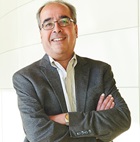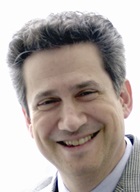Sriram Krishnaswamy, PhD, and Jeffrey I. Weitz, MD, to Present 2019 American Society of Hematology Ernest Beutler Lecture
(WASHINGTON, July 12, 2019) – The American Society of Hematology (ASH) will honor Sriram Krishnaswamy, PhD, of the Children’s Hospital of Philadelphia, and the Perelman School of Medicine at the University of Pennsylvania School of Medicine in Philadelphia and Jeffrey I. Weitz, MD, of McMaster University in Hamilton, Ontario with the 2019 Ernest Beutler Lecture and Prize for their significant research contributions to the understanding and treatment of blood clots.
The Ernest Beutler Lecture, named for the late Ernest Beutler, MD, past president of ASH and physician-scientist for more than 50 years, is a two-part lectureship that recognizes major translational advances related to a single topic. The award honors two individuals: one recognized for enabling advances in basic science, and the other recognized for using clinical science or translational research to carry basic science advances through to tangible improvements in patient care.
Drs. Krishnaswamy and Weitz will present their lecture, Blood Coagulation: From Molecular Mechanisms to Treatment of Thrombosis, on Monday, December 9, during the 61st ASH Annual Meeting and Exposition in Orlando. The lecture will explore the bench-to-bedside development of novel anticoagulants for the treatment of venous thromboembolism, abnormal blood clots in the veins that are responsible for up to 100,000 deaths in the United States per year.
“The novel anticoagulants we have access to today for blood disorders and many other conditions began with key insights made in a laboratory, and there is a clear translational path from the laboratory to the bedside,” said Dr. Krishnaswamy. “I am deeply honored to be recognized for this prestigious award and to share this lecture with Dr. Jeff Weitz.”

Dr. Krishnaswamy, the recipient of the basic science award, is a professor of pediatrics, biochemistry and biophysics at the University of Pennsylvania. He conducts his research at the research institute of the Children’s Hospital of Philadelphia. He studies mechanisms by which proteins interact to regulate enzyme function, particularly in the context of blood coagulation, and is an internationally recognized authority on the function of surface-dependent coagulation complexes, which are the targets of new oral anticoagulants. Dr. Krishnaswamy has performed experiments demonstrating how these complexes assemble, while characterizing potential approaches for their inhibition. His work has helped set the stage for establishing drug targets and drug development, including aptamers and novel non-active site anticoagulants. These therapeutics are expected to affect enzyme function in tunable ways for the treatment of either bleeding or clotting.

Dr. Weitz, the translational/clinical honoree, is a professor of medicine and biochemistry and biomedical sciences at McMaster University. His research focuses on understanding why blood clots occur in certain situations, such as in patients with cancer or those with mechanical heart valves, and how to prevent or treat them. Dr. Weitz’s studies encompass the full spectrum of research, from focusing on the basic biochemistry of blood clot formation in test tubes and in animal models to analyzing anti-clot therapies in human clinical trial participants. His work has prompted the development and licensing of new anticoagulants that simplify the prevention and treatment of thrombosis compared with the existing options, heparin and warfarin, because they are associated with less bleeding and do not require routine coagulation monitoring. This provides patients a better quality of life.
“It is an incredible honor to be selected for this prestigious award. It is not just an honor for me, but for my talented staff, my dedicated learners, and for my wonderful colleagues who made this possible,” said Dr. Weitz.
“Venous thromboembolism is a major cause of morbidity and mortality worldwide, and the development of new and improved therapies represents a significant breakthrough in hematology. Drs. Krishnaswamy and Weitz are the best two speakers to tell this fascinating story of how insights about enzymes and proteins in the laboratory translated into therapies that have revolutionized patient care and saved lives,” said ASH President Roy Silverstein, MD, of the Medical College of Wisconsin in Milwaukee. “We applaud their scientific contributions and look forward to the presentation.”
The American Society of Hematology (ASH) (www.hematology.org) is the world’s largest professional society of hematologists dedicated to furthering the understanding, diagnosis, treatment, and prevention of disorders affecting the blood. For 60 years, the Society has led the development of hematology as a discipline by promoting research, patient care, education, training, and advocacy in hematology. ASH publishes Blood (www.bloodjournal.org), the most cited peer-reviewed publication in the field, which is available weekly in print and online, as well as the newly launched, online, peer-reviewed open-access journal, Blood Advances (www.bloodadvances.org).
Contact:
Sara Khalaf, American Society of Hematology
[email protected]; 202-552-4925